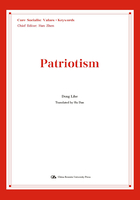
Chapter One Patriotism at Home and Abroad
The Chinese Dream of national rejuvenation points out the direction of China. It also serves as a great banner under which our 1.3 billion people rally for a better future. A great cause requires a great spirit, and a great spirit pushes forward a great cause. Without a common ideal and the united efforts on the part of the people, it is impossible to realize a rejuvenated nation of prosperity and happiness. Therefore, a powerful spirit is an imperative, and it is the spirit of patriotism. President Xi Jinping in his speech during the first plenary session of the 12th National People's Congress pointed out that“to realize the Chinese Dream, we must promote the Chinese spirit, which is the national spirit centered on patriotism, reform and innovation of our time. This kind of spirit unites and strengthens our nation. Patriotism unites the Chinese nation. Reform and innovation keeps us in pace with the times. People of all ethnic groups must promote the great spirit of our nation, and constantly enhance national unity and confidence, and energetically strive for a better future. ”
Patriotism is the core of the Chinese spirit and is the gene of our nation from generation to generation. It is due to patriotism embedded deep in our mind that our Chinese nation has survived for thousands of years under usually difficult and harsh circumstances. Reform and innovation is also part of patriotism. The spirit of traditional patriotism and modern-time spirit of reform and innovation are like two invisible wings that propeller our nation to go forward to realize the lofty dream of great national rejuvenation.
Patriotism is a lofty and divine idea that is pursued as a social value and constantly serves as an ideological theme by countries and civilized societies all over the world. Russia publishes National Guidelines for Patriotism Education every five years. Primary and high schools in Singapore hold national flag raising ceremony and sing national anthem every school day. The Korean national anthem says, “Love our dear motherland with our determination and spirit; Devote to her our heart and loyalty, misery or joy may we face. ”In national ceremonies in the United States, people would recite“I pledge allegiance to the flag of the United States of America, and to the republic for which it stands, one nation under God, indivisible, with liberty and justice for all. ”Also well known were President Kennedy's words“Do not ask what the country can do for you. Ask what you can do for the country. ”It can be said that there is no country in the world which does not uphold patriotism.
Quotations
Patriotism exists inmost parts of the world. However the elites may dislike it, most people in most nations would identify themselves as patriots.
Samuel Huntington
What is patriotism? The answer may not be as simple as it looks at first. Different people may have different answers to it owing to different perspectives and different ideas, and even the same person may give different answers under different circumstances. To put it simply, patriotism means loving one's motherland and being loyal to it. Then, what is“motherland”? To answer this question, we must first understand the meanings of four Chinese words:“国”(state or kingdom), “家”(family), “国家”(country)and“祖国”(motherland)in the context of Chinese culture. Based on ancient Chinese texts, the word“国”(classical spelling“國”, meaning state or kingdom)was derived from the ancient Chinese character“或”which meant“state”. During the Western Zhou Dynasty, a big square was put outside the character“或”, and it became“國”,adding the meaning that a state has boundary, within which the people live and work. So, the original meaning of“国”refers to a certain public living area. In ancient China, “国”(state or kingdom) was an area which the emperor enfeoffed his prince or duke. “家”(family)was an area the prince or duke enfeoffed his important minister or official. Later“国”and“家”were combined into one word, meaning“country”. Generally speaking, “country”includes three elements:land, people and sovereignty. That was probably how the ancient Chinese understood the meaning of“country”. In its classical spelling of the Chinese character“國”(state or kingdom), the little inside square“口”means residents; one line“一”means land; “戈”(a kind of ancient weapon)means force; the big square“囗”outside means border. “祖”(ancestor)means“temple for forebears”. So, in Chinese culture, “country”originally meant“land of ancestors”. In Western cultures, a“country”has similar meanings. That is why it is called“fatherland”or“motherland”, meaning it is a place the people have lived from generation to generation. In its extended meanings, a“country”also includes its“nationality”, that is, a stable group of people sharing a common living area, language, way of life, cultural tradition and psyche.
In modern language, a“country”has three layers of meaning:natural factor, society and government. The natural factor refers to the“territory”within the border, including its land forms like soil, sea, mountains, rivers, lakes, etc. and natural resources like forests, minerals, natural products, etc. Social factor refers to the so-called“compatriots”or“nationality”, that is, the people with close blood origin or social contacts who share a common culture, like the language, customs, rituals and psyches. The“government”element refers to the political organization established to maintain social order, national sovereignty and security. In all, a“country”is a comprehensive concept that combines factors of natural beings, political system, economy, nationality and culture into one. Specifically speaking, patriotism means loving one's own country's nationality, natural beings, history, culture and political system. The passion of patriotism is most expressed in one's national esteem, confidence and pride.